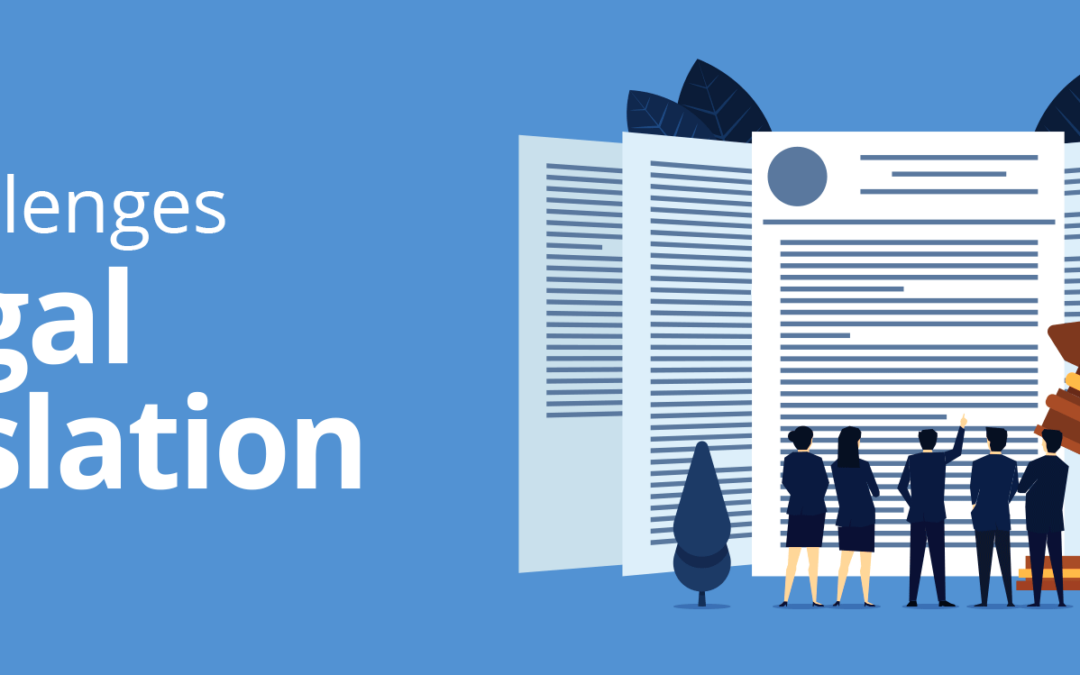When it comes to legal translation, simply taking a document and translating it from the source language to the desired target language isn’t enough.
Legal documents require a great deal of sensitivity, caution, and expertise, presumably much more than most translation projects.
What’s more, in legal translation accuracy is essential since the tiniest of mistakes could lead to ambiguities and confusion, which in turn might have dire consequences.
And this is only the tip of the iceberg!
Legal translation is a complex field. So, if you want to learn more about what it is, why it is so important, its challenges, and best practices, keep reading!
What is legal translation?
Legal translation deals with the process of transforming legal documents and materials from the source language to a target language.
Here are some examples of legal documents and materials:
- Contracts
- Wills and trusts
- Confidentiality agreements
- Depositions
- Court and witness transcripts
- Licenses
- Complaints
- Arbitration translation
- Legal disclaimers
- Litigation documentation
- Policies
- Legal Statements, etc.
It is crucial to keep the original meaning during the process. Still, a good legal translator has in-depth knowledge of the similarities and differences in legal systems and thus, can adapt the target document accordingly.
Due to its complexity, the legal language is often referred to as ‘Legalese’.
‘Legalese’ seems to be a language of its own, which in turn means, that a good legal translator should be able to understand all its nuances. In most cases, a word-for-word translation might not be accurate and, thus, would lead to implications. Thorough knowledge of both, the local laws and the legal language is a must.
What makes legal translation different?
Legal translation is a type of translation that stands at the crossroad between three areas – language theory, translation, and legal theory.
Law, in itself, is an unstable field since it relies on abstract notions that may vary significantly from country to country. What’s more, laws are constantly changing, making it even harder to keep up, for both lawyers and legal translators.
Laws are ubiquitous since they regulate any area of our life. Thus, legal translators are not only required to have a good understanding of legal matters but also to be well-acquainted with concepts and terminology of each area where the law is applied.
All these implications make it necessary for a legal translator to be an expert in translation and legal matters.
Why does legal translation matter?

Accuracy is a must when it comes to legal translation. Even the tiniest of mistakes might have dire legal consequences. An improper translation of a legal document could have an unfavorable effect on people’s rights and their fate.
Therefore, accuracy and precision in legal translations are crucial. A reliable legal translator must be well-acquainted with legal practices and regulations in target countries. Otherwise, there is a huge possibility of inaccuracies, which in turn can lead to misunderstandings.
To minimize the risk of errors, legal translators are required to translate only in their native language.
Native speakers of a language have a feeling for the language, that is acquired throughout their life experiences in the country. They can understand the language beyond the words, deciphering even the faintest of culture-related nuances.
Globalization is yet another factor that plays an important role when it comes to legal translation.
International companies, organizations, and unions are required to translate all their paperwork into the local languages of the countries where they operate. A huge part of this documentation falls into the category of legal translation.
Overall, legal translation can have a huge impact on people’s life. Thus, accuracy and precision are pivotal. What’s more, globalization makes our world even more interconnected. As a result, companies and institutions need legal translation to work together.
Take, for example, the GDPR (General Data Protection Regulation) law, imposed by the European Union. It regulates the privacy and security of collected data in several different countries.
To be understood and applied properly, the law should be translated into all languages of the EU members. A single mistake in the translation might lead to confusion and false application of the law.
Challenges in legal translation
Legal translation is a complex field. There are quite a few challenges that one might stumble upon. Legal translators should be well-equipped through professional experience and education to handle them properly.
Varying laws from country to country
Different countries have different laws. This means that the same offense might lead to different punishments in different countries.
This variety might lead to ambiguity and errors in legal translation. Although international organizations guide how to handle the differences, this does not lift legal translators’ duty of knowing even the tiniest of details.
A language expert should be familiar with the similarities and differences between the legislation systems in both languages. Linguists should be well-acquainted with legal terms and their equivalents or lack thereof.
Experts should also be trained to identify the proper usage of terms, depending on the context.
All in all, without in-depth knowledge of the legal language and terminology, mistakes are inevitable. Errors, on the other hand, can have dire consequences for the clients.
Constantly changing laws
Legislation is constantly changing and updating. This means that laws which were working a week or a month ago, might not be relevant by the end of the deadline of your translation project.
Thus, legal translators should always keep up with the latest updates, even when they happen overnight. To ensure that their knowledge is up-to-date, most legal translators join professional organizations.
Accuracy leaves no room for creativity
Legalese is a very rigid language, however, this does not make it easier. A legal translator should be familiar with which contexts, certain terms are used. This is quite challenging since most legal terms are rarely used in our everyday lives and sometimes, even native speakers misuse them.
Punctuation and syntax matter
Certain grammatical structures are very common in the legal language. Some say that legalese sounds ambiguous and pompous with its numerous terms. Nevertheless, legal language has its peculiarities and one cannot neglect them.
Some of the most common features of the legal language include:
- Passive voice
-
Complex, long sentences
Complex, long sentences
-
Commas, apostrophes, semicolons,
Commas, apostrophes, semicolons, etc.
Punctuation and syntax in legal translation matter more than you might think. For instance, omitting a single comma might create confusion. To avoid any ambiguities, it is always advisable to have a second linguist proofread the final translation.
Strict deadlines
As expected, legal translation often has strict deadlines. Legal documents are usually required for specific events at courtrooms or corporate meetings. Delays might have serious consequences for the clients, so the deadlines should be met at all costs.
To meet the final deadline, translators should be well-prepared to overcome any challenge that they may stumble upon. Otherwise, they risk submitting their final translation too late.
Best practices for translating legal documents
Challenges are very common in complex fields such as legal translation and often lead to implications and delays. To ensure timely delivery, there are some best practices that every good legal translator follows.
Provide well-structured source file
To get a quality translation, a client needs to provide a well-structured and clear source file. In some cases, it might even be possible to keep the structure of the source file, so that they are similar in form and style and thus, are easy to follow.
Whenever different formatting is needed, it is advisable to include an explanatory note. What’s more, some elements in the source file such as signatures, need not be translated. They are simply copied to the target file.
Ask experts when in doubt
Even legal translators might stumble upon an unfamiliar term. In such cases, it is best to consult a legal expert who can provide you with the right explanation, so that you can find the best translation.
As we have already discussed, in legal translation, accuracy is crucial. So, asking for a second opinion, when in doubt, is always the best option.
Consider the context of the document
Legal documents are used for different purposes. Thus, it is advisable to consider in what context the translated document will be used. This in turn might have certain implications for the style, tone, form, and terminology of the document.
To ensure there is no confusion, a client should always discuss all the details with the translator before they start working on the project.
Confidentiality is a must
Legal documents often contain sensitive information about individuals or organizations. Hence, confidentiality should be taken seriously during the legal translation process.
Good data security and non-disclosure agreements are the best ways to ensure that no information will be leaked during the translation process.
Proofreading is key

Accuracy is essential due to the legally binding nature of the legal documents. Even the slightest mistake, such as a missing comma, might have a devastating impact in the courtroom or during an important corporate meeting.
Therefore, having a second linguist proofread the final translation is very important.
It is important to note, the mistakes that happen are not due to a translator’s lack of skills.
A translator needs to read the same text over and over, during the translation process. By the end of the task, they get so well-acquainted with the text that it becomes extremely easy to overlook a tiny detail.
A fresh set of eyes, however, can be able to spot any discrepancies and ensure high-quality end translation.
Find the right expert linguists
If you want to receive a quality end translation, you need to find a good legal translator or a professional translation agency that works with native bilingual legal translators. Here are some tips on what to look for in a good linguist:
- Native speaker of the target language
- Legal specialization
- Additional certifications to ensure quality
- Language expertise in the working languages
All these factors ensure that linguists can cope with all the peculiarities of the legal language such as tone, style, punctuation, etc. What’s more, they will be able to handle even the subtlest nuances of meaning in a legal text and translate them accurately.
Finally, legal translations need to be legalized or certified for a translation to be recognized as official. Thus, legal translators need to be officially registered at institutions such as the Ministry of Justice or a regional court.
In conclusion
As you can see, legal translation is not exactly a breeze and is quite a challenging field. Legal translation requires a good command of the working languages as well as good translation skills, knowledge of the local legislation systems, and speed to meet tight deadlines.
Certain best practices can make the process more efficient. Nevertheless, a legal translator should be familiar with all peculiarities of this type of translation to provide a quality end translation.
